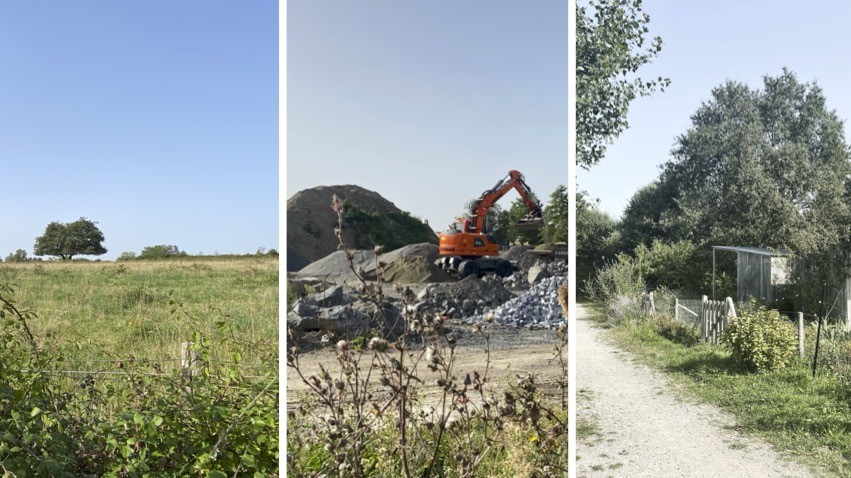The Doulon-Gohards Development Zone
A Site of Negotiation Between Public Urban Planning and Local Agroecological Resistance, in Service of the Common Good
The Doulon territory offers an exemplary case for observing the tensions between a public-led urban development model and a grassroots movement advocating for agroecology. This contribution explores the stakes of this conflictual encounter within a district of Nantes, and examines how project-based action might move beyond direct opposition to create “spaces of negotiation” capable of articulating these two forces — opening pathways for new ways of inhabiting and governing territories.
Located in eastern Nantes, Doulon-Gohards lies at the edge of the dense city, but still within the metropolitan ring road. Shaped by a strong market gardening heritage — tied to its position on the Loire's alluvial plain — and by a railway legacy still visible in the built environment, the area is also marked by social diversity and a long-standing culture of civic engagement.
Since the early 2000s, the metropolitan authority has identified this area as a strategic land reserve for urban expansion, with the ambition of developing a new residential district in response to local demographic growth. Since the 2010s, a public development project has been underway, combining housing (private, social, and affordable), public services and amenities, and an agricultural component aimed at supporting the last remaining intra-ring farms, committed to agroecological practices.
In parallel, a grassroots movement composed of local ecological collectives has emerged in opposition to the official plan. Challenging conventional metropolitan urbanism, it defends farmland preservation, biodiversity, and the inclusion of marginalized communities. It promotes alternative ways of cultivating, managing, and inhabiting the area — based on collective, self-managed, and ecologically sensitive practices.
In 2024, a new urban design team (atelier georges, lead landscape architect) was appointed to revisit the development framework in light of current ecological and social transitions. Their proposal aims to rethink land use, commit to environmental repair, protect ecosystems, and promote diversity in both uses and forms of dwelling.
At the same time, the citizen movement entrusted another design collective, Le Vent se lève, with the development of an alternative vision. Their project, Les Gohards en Commun.s, is conceived as an agroecological manifesto: placing commons and conviviality at the heart of urban policy, and envisioning the citizen as an active participant in the transformation of their environment through knowledge-sharing and the valorization of local resources.
Rather than framing these two projects — and the actors behind them — in opposition, which risks reproducing the public project as-is or reducing the alternative to a mere idealized counter-model, their coexistence should be seen as an opportunity. In Doulon, the friction between urbanism and agroecology could become the driver of a fertile project — if the negotiation spaces it opens are acknowledged and used to build a productive dialogue between public authorities and grassroots initiatives. This is precisely the purpose of this joint contribution from the designers of atelier georges and Le Vent se lève.
Charles Rives
Thibault Barbier
Karim Lahiani
atelier georges is an urban planning, landscape, and architecture practice that works on the transformation of cities and territories at the intersection of research, ecology, and project-based economies. The agency’s methods and tools earned it a distinction in the 2014 Young Urban Planners Award (Palmarès des Jeunes Urbanistes).
Charles Rives is an architect and urban planner, with a PhD in architecture (Université Paris-Est), and project lead at atelier georges. He teaches at the École nationale supérieure d’architecture de Paris-Belleville and is an associate researcher at the OCS laboratory.
Thibault Barbier is a landscape architect and urban planner, co-founder of atelier georges. He is an associate professor at the École d’architecture de la ville et des territoires Paris-Est / Université Gustave Eiffel.
Le Vent se lève is a radical ecology design studio founded in 2022. Awarded the Young Urban Planners Award in 2024, it focuses on developing and supporting alternative projects that resist destructive urbanization. The studio operates within a dynamic of systemic bifurcation and the regeneration of living environments degraded by modernity.
Karim Lahiani is a landscape architect, urban planner, geographer, and political scientist. He holds degrees from the École nationale supérieure de paysage de Versailles, the Institute of Urban Planning in Lyon, and the Institutes of Political Studies in Paris and Lyon.
← go back to
the programme
photography → Terres agricoles du Bois des Anses, unités de traitement des terres Chemin du Moulin des Marais, jardins familiaux des Chaupières, quartier Doulon-Gohards, Nantes, France, Groupement ateliergeorges, 2024.
